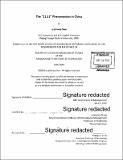| dc.contributor.advisor | Juanjuan Zhang. | en_US |
| dc.contributor.author | Chen, Lu (Lu Alora) | en_US |
| dc.contributor.other | Sloan School of Management. | en_US |
| dc.coverage.spatial | a-cc--- | en_US |
| dc.date.accessioned | 2016-09-30T19:34:41Z | |
| dc.date.available | 2016-09-30T19:34:41Z | |
| dc.date.copyright | 2016 | en_US |
| dc.date.issued | 2016 | en_US |
| dc.identifier.uri | http://hdl.handle.net/1721.1/104541 | |
| dc.description | Thesis: S.M. in Management Studies, Massachusetts Institute of Technology, Sloan School of Management, 2016. | en_US |
| dc.description | Cataloged from PDF version of thesis. | en_US |
| dc.description | Includes bibliographical references (page 44). | en_US |
| dc.description.abstract | Along with the rise of the Internet and smartphones, e-commerce plays a more and more important role in the Chinese consumer market. In 2009, Alibaba first created the "11.11" shopping festival. In 2015, the total GMV of "11.11" exceeded US$14.3 billion, which was even more than the total transaction volume of the "Black Friday" and "Cyber Monday" in the US. Then, what is this "11.11" phenomenon, and why is this "11.11" so incredible? This thesis aims to study this phenomenon. The paper will start by providing an overview and development of the "11.11" shopping festival in China. Then, it will illustrate the reasons for the success of the "11.11" phenomenon from policy, economy, social and service, and technology aspects. Afterward, it will analyze the impacts of the "11.11" phenomenon to consumers, suppliers, express companies and point out the problems and challenges in this phenomenon. It will also compare the "11.11" shopping festival with the Black Friday in the US. In the last part of the paper, it will summarize some takeaways from the analysis. The data used in this paper are mainly from secondary sources, which consist of research from large institutions such as National Bureau of Statistics of China, Chinese Ministry of Commerce, and State Administration of Foreign Exchange (SAFE), previous research by well-known research houses such as McKinsy, Deloitte, and several others. Key words: "11.11" shopping festival, tmall.com, e-commerce, online shopping. | en_US |
| dc.description.statementofresponsibility | by Lu (Alora) Chen. | en_US |
| dc.format.extent | 44 pages | en_US |
| dc.language.iso | eng | en_US |
| dc.publisher | Massachusetts Institute of Technology | en_US |
| dc.rights | M.I.T. theses are protected by copyright. They may be viewed from this source for any purpose, but reproduction or distribution in any format is prohibited without written permission. See provided URL for inquiries about permission. | en_US |
| dc.rights.uri | http://dspace.mit.edu/handle/1721.1/7582 | en_US |
| dc.subject | Sloan School of Management. | en_US |
| dc.title | The "11.11" phenomenon in China | en_US |
| dc.title.alternative | Eleven point eleven phenomenon in China | en_US |
| dc.type | Thesis | en_US |
| dc.description.degree | S.M. in Management Studies | en_US |
| dc.contributor.department | Sloan School of Management | |
| dc.identifier.oclc | 958426756 | en_US |
